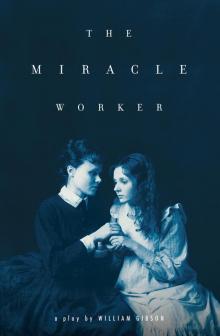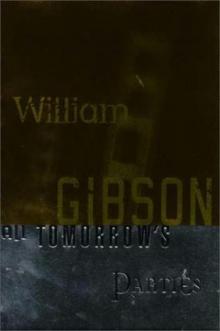- Home
- William Gibson
The Miracle Worker
The Miracle Worker Read online
“When we do the best we can, we never know what miracle is wrought in our life, or in the life of another.”
—Helen Keller
THE MIRACLE WORKER
“An emotional earthquake . . . a magnificent drama. A play with the power to wrench the heart.”
—New York Mirror
“Really and truly powerful, hair-raising, spine-tingling, touching and just plain wonderful!”
—New York Herald Tribune
Thank you for downloading this Scribner eBook.
* * *
Join our mailing list and get updates on new releases, deals, bonus content and other great books from Scribner and Simon & Schuster.
CLICK HERE TO SIGN UP
or visit us online to sign up at
eBookNews.SimonandSchuster.com
for the wife and the kids and the next breath with love
THE MIRACLE WORKER
A PLAY IN THREE ACTS
“At another time she asked, ‘What is a soul?’ ‘No one knows,’ I replied; ‘but we know it is not the body, and it is that part of us which thinks and loves and hopes.’ . . . [and] is invisible. . . . ‘But if I write what my soul thinks,’ she said, ‘then it will be visible, and the words will be its body.’ ”
—ANNIE SULLIVAN, 1891
THE PLAYING SPACE is divided into two areas by a more or less diagonal line, which runs from downstage right to upstage left.
THE AREA behind this diagonal is on platforms and represents the Keller house; inside we see, down right, a family room, and up center, elevated, a bedroom. On stage level near center, outside a porch, there is a water pump.
THE OTHER AREA, in front of the diagonal, is neutral ground; it accommodates various places as designated at various times—the yard before the Keller home, the Perkins Institution for the Blind, the garden house, and so forth.
THE CONVENTION OF THE STAGING is one of cutting through time and place, and its essential qualities are fluidity and spatial counterpoint. To this end, the less set there is, the better; in a literal set, the fluidity will seem merely episodic. The stage therefore should be free, airy, unencumbered by walls. Apart from certain practical items—such as the pump, a window to climb out of, doors to be locked—locales should be only skeletal suggestions, and the movement from one to another should be accomplishable by little more than lights.
CHARACTERS
A DOCTOR
KATE
KELLER
HELEN
MARTHA
PERCY
AUNT EV
JAMES
ANAGNOS
ANNIE SULLIVAN
VINEY
BLIND GIRLS
A SERVANT
OFFSTAGE VOICES
TIME: The 1880’s.
PLACE: In and around the Keller homestead in Tuscumbia, Alabama; also, briefly, the Perkins Institution for the Blind, in Boston.
ACT I
IT IS NIGHT OVER THE KELLER HOMESTEAD.
Inside, three adults in the bedroom are grouped around a crib, in lamplight. They have been through a long vigil, and it shows in their tired bearing and disarranged clothing. One is a young gentlewoman with a sweet girlish face, KATE KELLER; the second is an elderly DOCTOR, stethoscope at neck, thermometer in fingers; the third is a hearty gentleman in his forties with chin whiskers, CAPTAIN ARTHUR KELLER.
DOCTOR: She’ll live.
KATE: Thank God.
(The DOCTOR leaves them together over the crib, packs his bag.)
DOCTOR: You’re a pair of lucky parents. I can tell you now, I thought she wouldn’t.
KELLER: Nonsense, the child’s a Keller, she had the constitution of a goat. She’ll outlive us all.
DOCTOR [AMIABLY]: Yes, especially if some of you Kellers don’t get a night’s sleep. I mean you, Mrs. Keller.
KELLER: You hear, Katie?
KATE: I hear.
KELLER [INDULGENT]: I’ve brought up two of them, but this is my wife’s first, she isn’t battle-scarred yet.
KATE: Doctor, don’t be merely considerate, will my girl be all right?
DOCTOR: Oh, by morning she’ll be knocking down Captain Keller’s fences again.
KATE: And isn’t there anything we should do?
KELLER [JOVIAL]: Put up stronger fencing, ha?
DOCTOR: Just let her get well, she knows how to do it better than we do.
(He is packed, ready to leave.)
Main thing is the fever’s gone, these things come and go in infants, never know why. Call it acute congestion of the stomach and brain.
KELLER: I’ll see you to your buggy, Doctor.
DOCTOR: I’ve never seen a baby, more vitality, that’s the truth.
(He beams a good night at the baby and KATE, and KELLER leads him downstairs with a lamp. They go down the porch steps, and across the yard, where the DOCTOR goes off left; KELLER stands with the lamp aloft. KATE meanwhile is bent lovingly over the crib, which emits a bleat; her finger is playful with the baby’s face.)
KATE: Hush. Don’t you cry now, you’ve been trouble enough. Call it acute congestion, indeed, I don’t see what’s so cute about a congestion, just because it’s yours. We’ll have your father run an editorial in his paper, the wonders of modern medicine, they don’t know what they’re curing even when they cure it. Men, men and their battle scars, we women will have to—
(But she breaks off, puzzled, moves her finger before the baby’s eyes.)
Will have to—Helen?
(Now she moves her hand, quickly.)
Helen.
(She snaps her fingers at the baby’s eyes twice, and her hand falters; after a moment she calls out, loudly.)
Captain. Captain, will you come—
(But she stares at the baby, and her next call is directly at her ears.)
Captain!
(And now, still staring, KATE screams. KELLER in the yard hears it, and runs with the lamp back to the house. KATE screams again, her look intent on the baby and terrible. KELLER hurries in and up.)
KELLER: Katie? What’s wrong?
KATE: Look.
(She makes a pass with her hand in the crib, at the baby’s eyes.)
KELLER: What, Katie? She’s well, she needs only time to—
KATE: She can’t see. Look at her eyes.
(She takes the lamp from him, moves it before the child’s face.)
She can’t see!
KELLER: [HOARSELY]: Helen.
KATE: Or hear. When I screamed she didn’t blink. Not an eyelash—
KELLER: Helen. Helen!
KATE: She can’t hear you!
KELLER: Helen!
(His face has something like fury in it, crying the child’s name; KATE almost fainting presses her knuckles to her mouth, to stop her own cry.
The room dims out quickly.
Time, in the form of a slow tune of distant belfry chimes which approaches in a crescendo and then fades, passes; the light comes up again on a day five years later, on three kneeling children and an old dog outside around the pump.
The dog is a setter named BELLE, and she is sleeping. Two of the children are Negroes, MARTHA and PERCY. The third child is HELEN, six and a half years old, quite unkempt, in body a vivacious little person with a fine head, attractive, but noticeably blind, one eye larger and protruding; her gestures are abrupt, insistent, lacking in human restraint, and her face never smiles. She is flanked by the other two, in a litter of paper-doll cutouts, and while they speak HELEN’S hands thrust at their faces in turn, feeling baffledly at the movements of their lips.)
MARTHA [SNIPPING]: First I’m gonna cut off this doctor’s legs, one, two, now then—
PERCY: Why you cuttin’ off that doctor’s legs?
MARTHA: I’m gonna give
him a operation. Now I’m gonna cut off his arms, one, two. Now I’m gonna fix up—
(She pushes HELEN’S hand away from her mouth.)
You stop that.
PERCY: Cut off his stomach, that’s a good operation.
MARTHA: No, I’m gonna cut off his head first, he got a bad cold.
PERCY: Ain’t gonna be much of that doctor left to fix up, time you finish all them opera—
(But HELEN is poking her fingers inside his mouth, to feel his tongue; he bites at them, annoyed, and she jerks them away. HELEN now fingers her own lips, moving them in imitation, but soundlessly.)
MARTHA: What you do, bite her hand?
PERCY: That’s how I do, she keep pokin’ her fingers in my mouth, I just bite ’em off.
MARTHA: What she tryin’ do now?
PERCY: She tryin’ talk. She gonna get mad. Looka her tryin’ talk.
(HELEN is scowling, the lips under her fingertips moving in ghostly silence, growing more and more frantic, until in a bizarre rage she bites at her own fingers. This sends PERCY off into laughter, but alarms MARTHA.)
MARTHA: Hey, you stop now.
(She pulls HELEN’S hand down.)
You just sit quiet and—
(But at once HELEN topples MARTHA on her back, knees pinning her shoulders down, and grabs the scissors. MARTHA screams. PERCY darts to the bell string on the porch, yanks it, and the bell rings.
Inside, the lights have been gradually coming up on the main room, where we see the family informally gathered, talking, but in pantomime; KATE sits darning socks near a cradle, occasionally rocking it; CAPTAIN KELLER in spectacles is working over newspaper pages at a table; a benign visitor in a hat, AUNT EV, is sharing the sewing basket, putting the finishing touches on a big shapeless doll made out of towels; an indolent young man, JAMES KELLER, is at the window watching the children.
With the ring of the bell, KATE is instantly on her feet and out the door onto the porch, to take in the scene; now we see what these five years have done to her, the girlish playfulness is gone, she is a woman steeled in grief.)
KATE [FOR THE THOUSANDTH TIME]: Helen.
(She is down the steps at once to them, seizing HELEN’S wrists and lifting her off MARTHA; MARTHA runs off in tears and screams for momma, with PERCY after her.)
Let me have those scissors.
(Meanwhile the family inside is alerted, AUNT EV joining JAMES at the window; CAPTAIN KELLER resumes work.)
JAMES [BLANDLY]: She only dug Martha’s eyes out. Almost dug. It’s always almost, no point worrying till it happens, is there?
(They gaze out, while KATE reaches for the scissors in HELEN’S hand. But HELEN pulls the scissors back, they struggle for them a moment, then KATE gives up, lets HELEN keep them. She tries to draw HELEN into the house. HELEN jerks away. KATE next goes down on her knees, takes HELEN’S hands gently, and using the scissors like a doll, makes HELEN caress and cradle them; she points HELEN’S finger housewards. HELEN’S whole body now becomes eager; she surrenders the scissors, KATE turns her toward the door and gives her a little push. HELEN scrambles up and toward the house, and KATE rising follows her.)
AUNT EV: How does she stand it? Why haven’t you seen this Baltimore man? It’s not a thing you can let go on and on, like the weather.
JAMES: The weather here doesn’t ask permission of me, Aunt Ev. Speak to my father.
AUNT EV: Arthur. Something ought to be done for that child.
KELLER: A refreshing suggestion. What?
(KATE entering turns HELEN to AUNT EV, who gives her the towel doll.)
AUNT EV: Why, this very famous oculist in Baltimore I wrote you about, what was his name?
KATE: Dr. Chisholm.
AUNT EV: Yes, I heard lots of cases of blindness people thought couldn’t be cured he’s cured, he just does wonders. Why don’t you write to him?
KELLER: I’ve stopped believing in wonders.
KATE [ROCKS THE CRADLE]: I think the Captain will write to him soon. Won’t you, Captain?
KELLER: No.
JAMES [LIGHTLY]: Good money after bad, or bad after good. Or bad after bad—
AUNT EV: Well, if it’s just a question of money, Arthur, now you’re marshal you have this Yankee money. Might as well—
KELLER: Not money. The child’s been to specialists all over Alabama and Tennessee, if I thought it would do good I’d have her to every fool doctor in the country.
KATE: I think the Captain will write to him soon.
KELLER: Katie. How many times can you let them break your heart?
KATE: Any number of times.
(HELEN meanwhile sits on the floor to explore the doll with her fingers, and her hand pauses over the face: this is no face, a blank area of towel, and it troubles her. Her hand searches for features, and taps questioningly for eyes, but no one notices. She then yanks at her AUNT’S dress, and taps again vigorously for eyes.)
AUNT EV: What, child?
(Obviously not hearing, HELEN commences to go around, from person to person, tapping for eyes, but no one attends or understands.)
KATE [NO BREAK]: As long as there’s the least chance. For her to see. Or hear, or—
KELLER: There isn’t. Now I must finish here.
KATE: I think, with your permission, Captain, I’d like to write.
KELLER: I said no, Katie.
AUNT EV: Why, writing does no harm, Arthur, only a little bitty letter. To see if he can help her.
KELLER: He can’t.
KATE: We won’t know that to be a fact, Captain, until after you write.
KELLER [RISING, EMPHATIC]: Katie, he can’t.
(He collects his papers.)
JAMES [FACETIOUSLY]: Father stands up, that makes it a fact.
KELLER: You be quiet! I’m badgered enough here by females without your impudence.
(JAMES shuts up, makes himself scarce. HELEN now is groping among things on KELLER’S desk, and paws his papers to the floor. KELLER is exasperated.)
Katie.
(KATE quickly turns HELEN away, and retrieves the papers.)
I might as well try to work in a henyard as in this house—
JAMES [PLACATING]: You really ought to put her away, Father.
KATE [STARING UP]: What?
JAMES: Some asylum. It’s the kindest thing.
AUNT EV: Why, she’s your sister, James, not a nobody—
JAMES: Half sister, and half-mentally defective, she can’t even keep herself clean. It’s not pleasant to see her about all the time.
KATE: Do you dare? Complain of what you can see?
KELLER [VERY ANNOYED]: This discussion is at an end! I’ll thank you not to broach it again, Ev.
(Silence descends at once. HELEN gropes her way with the doll, and KELLER turns back for a final word, explosive.)
I’ve done as much as I can bear, I can’t give my whole life to it! The house is at sixes and sevens from morning till night over the child, it’s time some attention was paid to Mildred here instead!
KATE [GENTLY DRY]: You’ll wake her up, Captain.
KELLER: I want some peace in the house, I don’t care how, but one way we won’t have it is by rushing up and down the country every time someone hears of a new quack. I’m as sensible to this affliction as anyone else, it hurts me to look at the girl.
KATE: It was not our affliction I meant you to write about, Captain.
(HELEN is back at AUNT EV, fingering her dress, and yanks two buttons from it.)
AUNT EV: Helen! My buttons.
(HELEN pushes the buttons into the doll’s face. KATE now sees, comes swiftly to kneel, lifts HELEN’S hand to her own eyes in question.)
KATE: Eyes?
(HELEN nods energetically.)
She wants the doll to have eyes.
(Another kind of silence now, while KATE takes pins and buttons from the sewing basket and attaches them to the doll as eyes. KELLER stands, caught, and watches morosely. AUNT EV blinks, and conceals her emotion by inspecting her dre
ss.)
AUNT EV: My goodness me, I’m not decent.
KATE: She doesn’t know better, Aunt Ev. I’ll sew them on again.
JAMES: Never learn with everyone letting her do anything she takes it into her mind to—
KELLER: You be quiet!
JAMES: What did I say now?
KELLER: You talk too much.
JAMES: I was agreeing with you!
KELLER: Whatever it was. Deprived child, the least she can have are the little things she wants.
(JAMES, very wounded, stalks out of the room onto the porch; he remains here, sulking.)
AUNT EV [INDULGENTLY]: It’s worth a couple of buttons, Kate, look.
(HELEN now has the doll with eyes, and cannot contain herself for joy; she rocks the doll, pats it vigorously, kisses it.)
This child has more sense than all these men Kellers, if there’s ever any way to reach that mind of hers.
(But HELEN suddenly has come upon the cradle, and unhesitatingly overturns it; the swaddled baby tumbles out, and CAPTAIN KELLER barely manages to dive and catch it in time.)
KELLER: Helen!
(All are in commotion, the baby screams, but HELEN unperturbed is laying her doll in its place. KATE on her knees pulls her hands off the cradle, wringing them; HELEN is bewildered.)
KATE: Helen, Helen, you’re not to do such things, how can I make you understand—
KELLER [HOARSELY]: Katie.
KATE: How can I get it into your head, my darling, my poor—
KELLER: Katie, some way of teaching her an iota of discipline has to be—
KATE [FLARING]: How can you discipline an afflicted child? Is it her fault?
(HELEN’S fingers have fluttered to her MOTHER’S lips, vainly trying to comprehend their movements.)
KELLER: I didn’t say it was her fault.
KATE: Then whose? I don’t know what to do! How can I teach her, beat her—until she’s black and blue?
KELLER: It’s not safe to let her run around loose. Now there must be a way of confining her, somehow, so she can’t—
KATE: Where, in a cage? She’s a growing child, she has to use her limbs!
KELLER: Answer me one thing, is it fair to Mildred here?

 Pattern Recognition
Pattern Recognition Spook Country
Spook Country Neuromancer
Neuromancer Skinner's Room
Skinner's Room The Difference Engine
The Difference Engine Mona Lisa Overdrive
Mona Lisa Overdrive Zero History
Zero History The Peripheral
The Peripheral Idoru
Idoru Johnny Mnemonic
Johnny Mnemonic Count Zero
Count Zero Agency
Agency Virtual Light
Virtual Light All Tomorrow's Parties
All Tomorrow's Parties The Miracle Worker
The Miracle Worker Disneyland with the Death Penalty
Disneyland with the Death Penalty Idoru tb-2
Idoru tb-2 Count Zero s-2
Count Zero s-2 The Gernsback Continuum
The Gernsback Continuum New Rose hotel (tales)
New Rose hotel (tales) All Tomorrow's Parties bt-3
All Tomorrow's Parties bt-3 Hinterlands
Hinterlands Thirteen Views Of A Cardboard City
Thirteen Views Of A Cardboard City Neuromancer ts-1
Neuromancer ts-1 Virtual light b-1
Virtual light b-1